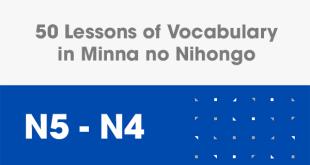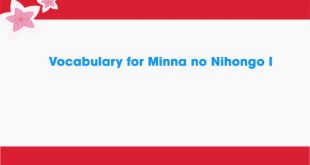Minna No Nihongo Lesson 22 Grammar
1. Modify nouns
In lessons 2 and 8, we have learned about noun modifications such as:
ミラーさんのほん
Mr. Miller’s book
あたらしいうち
New house
きれいなうち
Nice house
In Japanese, when modifying nouns, the modifier always precedes the modified part, whether the modifier is word, phrase or sentence. Today we will learn about moderation other than what was shown above.
2. Modify nouns with secondary clauses
– The preceding part modifying the noun must be in the ordinary form. If the subclause is an adjective with an ending [な], replace [だ] with [な], and if a noun, replace [だ] with [の]
For example :
とうきょうへ いくひと
People are going to Tokyo
とうきょうへいかないひと
People do not go to Tokyo
とうきょうへいったひと
person who went to Tokyo
とうきょうへいかなかったひと
person did not go to Tokyo
せがたかくて、かみがくろいひと
Tall man and black hair
しんせつで、きれいなひと
Beautiful and kind
60さいのひと
People 60 years old
– You can choose any noun in the sentence, and then convert the sentence into a phrase to add meaning to that noun
For example :
わたしはせんしゅうえいがをみました。
I saw a movie last week
わたしがせんしゅうみたえいが。
The movie that I watched last week
わたしはあしたともだちにあいます。
I will meet you tomorrow
わたしがあしたあうともだち。
The friend that I will meet on mmai day
The bolded nouns become the modified words, so the accompanying auxiliary words are no longer needed
– Modified nouns are used in many different sentence patterns (such as ミラーさんがすんでいたうち)
For example :
これは ミラーさんがすんでいたうち です。
This is the house Mr. Miller has lived in
わたしはミラーさんがすんでいたうち がすきです。
I like the house Mr. Miller lives in
ミラーさんがすんでいたうちはふるいです。
The house Mr. Miller lived in was old
3. The noun + [が]
In sub-clauses and modifying clauses for nouns and subjects, [が]
For example :
これはミラーさんがつくってケーキです。
This is the cake Mr. Miller made
4. The verb dictionary form + じかん / ようじ / やくそく
– When we want to talk about time to do something, we use the pre-dictionary verb form [じかん]
For example :
わたしはあさごはんをたべるじかんがありません
I don’t have time for breakfast
– When we want to express the content of a busy job or a business, we use the preposal dictionary verbs [ようじ] and [やくそく]
For example :
ともだちとえいがをみるやくそくがあります。
I have an appointment to go to the cinema with you
きのうはしやくしょへいくようじがありました。
Yesterday, I had a job to go to the City Administration Office.
Related Post: Minna No Nihongo Lesson 22 Vocabulary
 Learn Japanese Free Learn Japanese Free
Learn Japanese Free Learn Japanese Free







